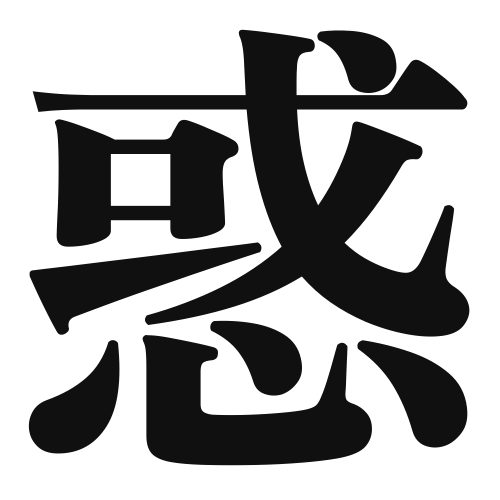1. Overview of Meaning
The kanji “惑” (waku) means to be perplexed, confused, or to be lost in thought. It conveys a sense of uncertainty or being unable to make a decision.
2. Formation and Radical
Formation of the Kanji: The kanji “惑” is a compound character (会意文字) that combines elements to convey its meaning. It consists of the radical for “heart” (心) at the bottom, indicating emotions, and the character “惑” itself, which suggests confusion or entanglement.
Radical: The radical of “惑” is 心 (shin), which relates to the heart or emotions.
3. Examples of Usage
Common Words and Phrases: Some common words that include “惑” are:
- 惑星 (わくせい, wakusei) – planet
- 惑わす (まどわす, madowasu) – to confuse or to mislead
Example Sentences in Daily Conversation:
- 彼は選択に惑っている。 (かれはせんたくにまどっている。) – He is perplexed by his choices.
- その問題は私を惑わせる。 (そのもんだいはわたしをまどわせる。) – That problem confuses me.
4. Synonyms and Antonyms
Similar Kanji: A similar kanji is “迷” (mei), which also means to be lost or confused, but it often implies being lost in a physical sense or in a decision-making process.
Antonyms: An antonym of “惑” could be “明” (mei), which means clear or bright, indicating clarity of thought or understanding.
5. Cultural and Historical Background
Relation to Japanese Culture: The concept of being “惑” is often reflected in Japanese literature and philosophy, where the struggle with confusion and uncertainty is a common theme.
Proverbs and Idioms: One relevant proverb is “迷ったら、行動せよ” (まよったら、こうどうせよ), which translates to “If you are lost, take action,” emphasizing the importance of overcoming confusion through decisive action.
